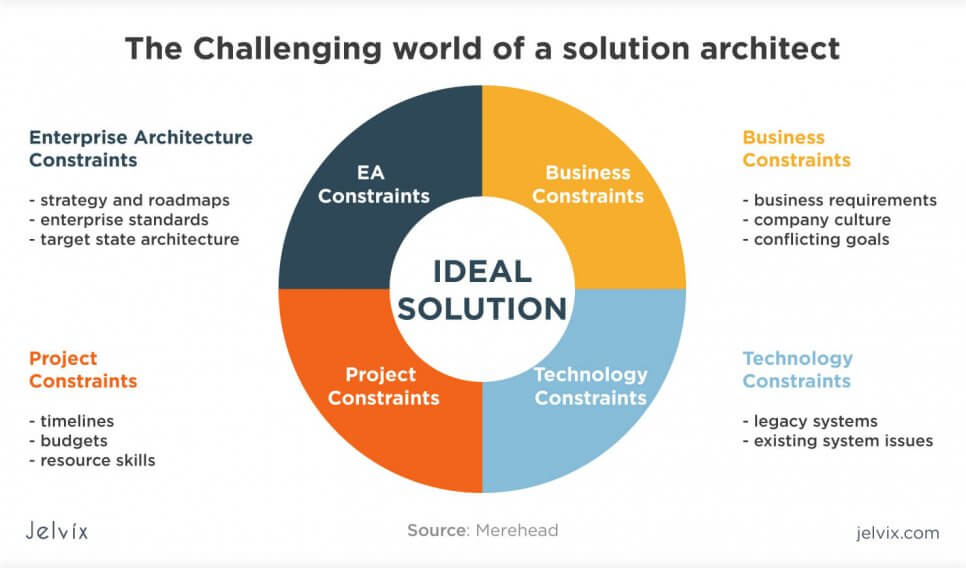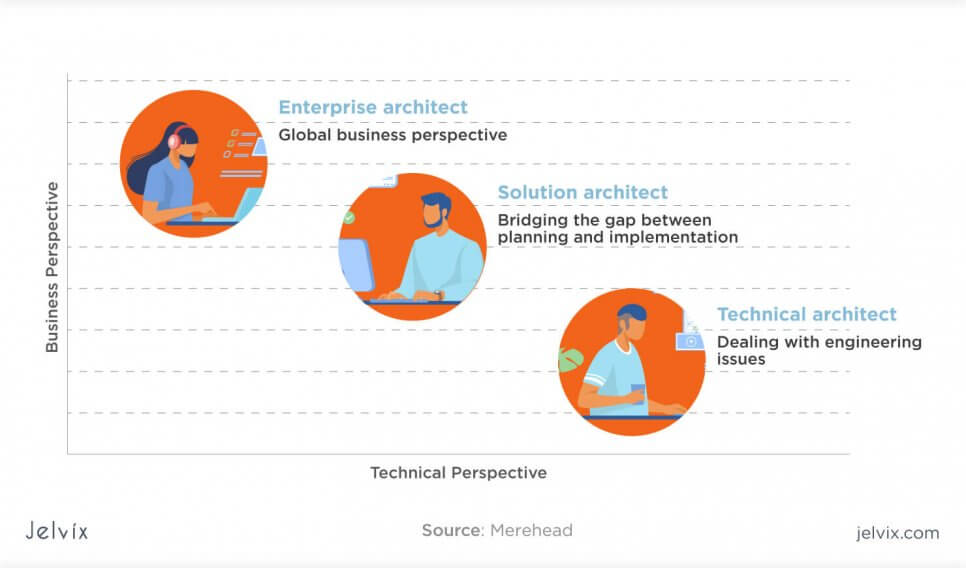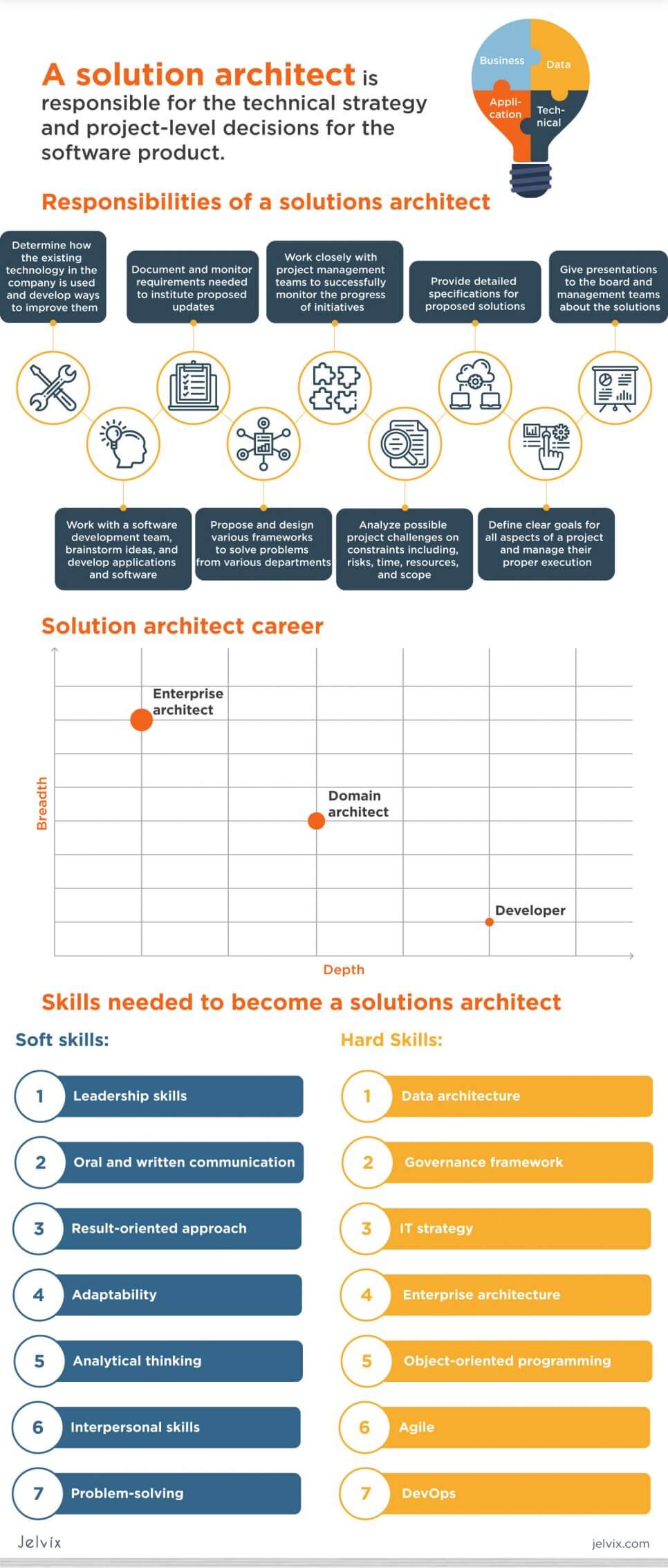The boom of the internet in the 90s spurred the births of many tech companies. At first, fields such as enterprise architecture and software architecture were created to design a structure on how to develop products like software or applications. This subsequently triggered the need for a different work methodology.
Nowadays, tech companies use different, agile methodologies to organize the process of developing a solution. Many times software engineering teams are experts at solving tech problems, but they struggle to understand the needs of a corporate environment.
The same happens with enterprise architects—while they are experts on business needs, they don’t necessarily know how to translate them for the developers.
This is where a solutions architect enters the picture. By being an expert on both enterprise and technology, they create a connection to optimize teamwork. This may be the first time you hear about solutions architects, but this career is on the rise, alongside the growth of the tech industry. The term architect was borrowed from the construction industry, but in this context, it means a position that oversees the bigger picture.
Tech giants like Amazon and Microsoft hire many solutions architects for different departments in their companies. They even offer solutions architect certifications for their platforms (Amazon Web Services and Azure, respectively).
Below is solutions architect definition and everything you need to know from what it takes to become one to the benefits of hiring them.
What is a solutions architect?
A solutions architect is the leader when breaching the gap between the enterprise and the technology solutions. A solution architect has to assess the corporate environment and design, manage, and maintain software solutions to solve certain business problems.
A solutions architect not only has to have the technical knowledge to develop software, but also the business skills to navigate the complex waters of corporate relationships. As the name suggests, they are tasked with designing a structure to solve a problem. In other words, they make plans or form solutions that will adapt the best to the environment that they will be used in.
Generally, a solutions architect works with a development team to build applications and software. This person will guide the team on how to formulate the best technical solution possible while taking into account the nature of the business, scalability, and existing hardware.
This role requires extensive knowledge of how things work and the ability to produce concise explanations when dealing with individuals from a non-technical background. Essentially, a solutions architect has to convince everyone that the software they design is the best possible solution to a problem.
Skills needed to become a solutions architect
Based on a quick search on LinkedIn, this is a list of some common skills that companies look for when hiring a solutions architect.
Hard skills
- Data architecture: This is the ability to structure and maintain data in a way that it becomes valuable to the business. Many companies now accumulate tons of data from their business platforms, and they need solutions that build and manage models to visualize it.
- Governance framework: It outlines the structure of an organization and highlights the role of each position and the power chain for decision-making. A framework sets standards, rules, and regulations for all the processes in an organization. Solutions architects use data governance frameworks to make decisions when developing a solution.
- IT strategy: A part of a solutions architect’s job is to plan, create, manage, and implement a solution to a specific business problem. Having a good IT strategy means being capable of forming efficient steps to approach tech-related issues.
- Enterprise architecture: It is a set of structures that determine how an organization can achieve its entrepreneurial goals. As solutions architects act as the main connection between enterprise and technology, they need to understand both sides of things.
- Object-oriented programming: In solutions architecture, the most used languages are object-oriented programming languages. Therefore, being proficient at any OOP language like Java or Python is a must in this industry.
- Agile: It is a set of rules and methodologies used to develop a product. It optimizes the whole process to make it faster. This is mostly applied in tech companies, so familiarity with the concept will give you a push in the job market.
- DevOps: According to Career Karma, DevOps is a combination of two teams—the development team and the operations team. This means having the ability to combine both areas to create products or formulate solutions more efficiently and quicker.
Soft skills
- Leadership: A solutions architect has to lead a development team to follow a specific vision for the software solution. This is why this career path demands individuals with good leadership abilities.
- Oral and written communication: Solutions architects need to give presentations about the solutions that they have designed. In order to explain well, relay their vision, and summarize the entire aspects of the solution, they need to have great communication skills.
- Result-oriented: As the name suggests, a solutions architect must be able to deliver results. Their main job is to develop solutions for specific business problems, and failure to do so could result in poor business performance.
- Adaptability: Solutions architects, as any other profession in the tech industry, must be able to adapt to changes. New technologies are constantly being developed. Therefore the ability to adapt to these changes is a skill that is highly sought after in the industry. Being able to learn fast will also be a plus.
- Analytical thinking: This skill is necessary for almost all computer science and engineering careers. Analytical thinking allows a person to identify a problem, analyze the information, and work on effective solutions quickly. This is a crucial skill to have, especially for solutions architects.
- Interpersonal: As mentioned before, solutions architects are the connection between the development team and the enterprise. This means being a good team player and being able to interact effectively across the company. Having good interpersonal skills will allow you to have good work relationships with everyone in the business.
- Problem-Solving: This skill goes hand-in-hand with analytical thinking. As an employee whose main task is to provide solutions, you need to be good and creative when tackling business issues. Don’t be afraid to think out of the box when approaching a problem.
Solutions architect role and responsibilities
According to Glassdoor solutions architect job description, these are some of the basic responsibilities:
- Determine how the existing technology in the company is used and develop ways to improve them.
- Work with a software development team to ensure what hardware is available for the projects, brainstorm ideas, and develop applications and software.
- Document and monitor requirements needed to institute proposed updates.
- Propose and design various frameworks to solve problems from various departments.
- Work closely with project management teams to successfully monitor the progress of initiatives.
- Analyze possible project challenges on constraints including, risks, time, resources, and scope.
- Provide detailed specifications for proposed solutions.
- Define clear goals for all aspects of a project and manage their proper execution.
- Give presentations to the board and management teams about the solutions and how to implement and maintain them.
Requirements
Solutions architect positions require a bachelor’s degree in computer science, or relevant experience, depending on the company. Some entry-level positions may allow for an equivalent work experience instead of a bachelor’s degree, but they are not very common.
Tech companies also typically look for solutions architects with some experience in managing positions. A solutions architect can come from, and venture into, other fields like software development or data engineering, but it is important they have legitimate certification to support a job application. And in some specialized cases, there are companies that ask for a master’s degree when hiring a solutions architect.
How to become a solutions architect
Something that may be obvious is to make sure you have a strong interest in the field, especially since this position requires a lot of studying and years of experience. If you are curious to find out if solutions architecture jobs will suit you, feel free to take online tests that are available on many existing websites.
With that said, the first step toward becoming a solutions architect is to get a bachelor’s degree with a major in any tech specialization like software engineering or computer science. Opting for a minor in business or business management will be an added bonus.
Another option is to attend a grad school and obtain a master’s degree in business administration. This way, you get to start from the beginning with the required knowledge in both enterprise and technology.
There is another alternative for you. Start with a course on software development, data science, or any other related field to enter the market. This is a less expensive solutions architect career path if you don’t have the financial means to enroll in a university.
After graduating, you can specifically apply to companies you know will give you the right experience. And instead of studying for four to six years in an institution that you can’t afford, start gaining work experience to increase your employability.
Solutions architect vs enterprise architect
The main difference between the two is the scope of the job positions. Enterprise solution architect sees the whole picture of the corporate tech ecosystem while solutions architect concentrates on using technology to solve business problems. The former has more experience in the business side of things and how technology can be applied to improve the existing business model. The latter, on the other hand, has more tech expertise and adapts it to the business’ needs.
Solutions architects choose what technologies are going to be used, how the software architecture is going to be structured, and how the product would adapt to the business needs. Enterprise architects make sure all the tech solutions that are being implemented comply with the set of standards, rules, and regulations of the organization, otherwise known as data governance architecture.
In other words, solutions depend on enterprise architecture and not the other way around. Every time a solutions architect wants to implement a solution, they have to check if it fits with the existing enterprise architecture.
Solutions architects use Unified Modeling Language (UML) or other methods to make diagrams of the software and applications they design, but they don’t actually sit down and type the code themselves.
There are also such positions as a technical architect and infrastructure architect. A technical architect takes care of the layout of IT systems and makes sure that the information architecture is implemented appropriately. An infrastructure architect is responsible for the technical requirements for infrastructure delivery and maintenance, and deployment of technical projects.
Benefits of hiring a solution architect
One of the key benefits of hiring a solutions architect or getting solution architecture consulting is the amount of experience they bring to the table. More often than not, solutions architects have five to ten years of experience with a very long list of successful software and applications.
This translates to fewer errors while developing a business solution. Without them, there is likely to be more error at the end of the developing process or when the software has already been implemented. For a business, this means a lot of money and time went down the drain.
Another benefit is that solutions architects can design software that is a perfect fit for the problem at hand without having to make many iterations, thanks to their experience. They also make sure the solution aligns with the existing system. Many solutions architects have certifications in advanced visualization tools that allow them to simplify the process and improve communication.
Solutions architects understand and produce solutions that can meet the needs of both the tech and business sides of things. Their extensive experience gives them more knowledge to provide creative software and applications. They can translate the business requirements into terms that programmers can understand and vice versa.
This will result in a more optimized development process that will cost less time, resources, and money while still providing the perfect solutions. You should hire a solutions architect if you have a complex problem to solve like system transitions and updating software. Also, in the case of handling high-risk projects, a solutions architect can help minimize errors and maximize performance.
Read more about the most common software development strategies and take a look at their benefits and drawbacks.
How much does a solutions architect make?
According to CareerExplorer, the average salary for a solutions architect in the United States is around $99,769 per year. It can be anywhere from $70,000 to $190,000, depending on experience and education. Top-level business solution architects make $94.32 per hour and $196,175 per year, and senior solutions architect earns $64.74 per hour and $134,655 per year.
On the other hand, starting level solutions architects earn $37.73 per hour and $78,484 per year. To compare, enterprise architects make an average of $144,827 per year in the United States. The top 20 percent computer network architects make over $160,000, and the lower 10 percent makes $60,310 annually.
Database architects make an average of $90,000 per year, which is around $43 per hour. Meanwhile, system architects make an average of $101,670 per year—the top 20 percent makes an impressive sum of $246,310 per year and $118 per hour.
Wrapping up
In summary, a solutions architect creates, designs, implements, and manages technology solutions to perfectly fit the corporate environment’s needs. They have to work closely with both the development team and the management team in an organization. They have to take into consideration all factors like scalability, budget, and timeframe when designing a product.
Solutions architects must have many tech skills like OOP languages, data architecture, governance framework, business models, IT strategy, and DevOps. They also have to have many soft skills to be successful, but most important of all is to have superb communication and interpersonal skills. One of their main responsibilities is to be able to present their solutions in a way that everybody in the company understands, especially the decision-makers.
Solutions architects depend on enterprise architects to know if their solutions fit perfectly with the corporate environment. Both positions are necessary for a big tech company to run smoothly. Having a solutions architect will minimize errors during the development process, save time and money, and you will end up with an effective solution that will align perfectly with the existing systems.
Artur Meyster is the CTO of Career Karma (YC W19), an online marketplace that matches career switchers with coding bootcamps. He is also the host of the Breaking Into Startups podcast, which features people with non-traditional backgrounds who broke into tech.
Need a qualified team of developers?
Use our talent pool to fill the expertise gap in your software development.


















